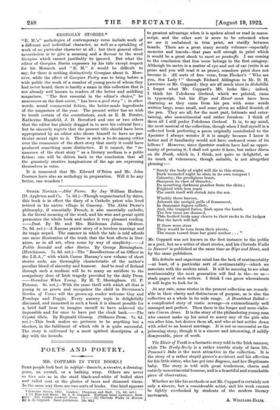POETS AND POETRY.
MR. COPPARD IN TWIN BOOKS.-f
SONE people look best in neg/ige—fiannels, a sweater, a dressing- gown, an overall, or a bathing wrap. Others are never so Men mis as in the staid black-and-white of boiled shirt and tailed coat or the glories of laces. and diamond tiaras. In the same way there are two sorts of books. One kind appears
• Georgian Stories, 1922. London : Chapman and Hall. 17a. ed. net.) t (1) Hips and Hates. By A. E. Coppard. Waltham Saint Lawrence, Berk- Shire : The Golden Cockerel Press. [5s.)—{2) Clorinda Walks in Heaven. 14, A. E. Coppard. Same publishers. [6s. Bd.]
to greatest advantage when it is spoken aloud or read in manu- script, and the other sort is more to be esteemed when we see it embalmed in trim print, set staidly between boards. There are a great many seemly volumes—especially memoirs and travels—that pass well enough in print which it would be a great shock to meet en pantoufle. I am coming to the conclusion that free verse belongs to the first category.
Although its metre is a matter of eye and not of ear (write it as prose and you will read it as prose), somehow print does not become it. All sorts of free verse, from Meeker's " Who are you, Sea Lady ? " through Richard Aldington to Mr. D. H. Lawrence or Mr. Coppard: they are all much nicer in deshabille.
I forget what Mr. Coppard's MS. looks like ; indeed, I think his Yokohama Garland, which we printed, came in typescript, but his Hips and Hawsl must have been charming as they came from his pen with some words written large, some small, and some given an added flourish of the pen. They are all, for the most part, intimate and enter- taining, also unsentimental and rather formless. I think of them all I still prefer Yokohama Garland. It is, to my mind, the most musical of the collection, though when I find myself in a collected book preferring a poem originally contributed to the Spectator I always wonder if it is simply because I know it better and if familiarity would not have endeared some of its fellows ? However, since Spectator readers have had an oppor- tunity of perusing it, I shall not quote it here, but rather Storm on the Heath, which is, I think, not quite so delightful, as its touch of vehemence, though suitable, is not altogether pleasing :-
" Surely the body of night will die in this storm, Dark wounded night be slain in its own tempest ! Calamity, the prodigious beast,
Sharpens its claw of thunder, Its mouthing darkness gnashes from the skies ; Frighted with iron roars The earth itself will shrink into the sea.
Windily these havocs, Athwart the unrigid gulfs of firmament, In dissonant fugues collide, And, like trapped furies, flash upon the heath.
The few trees are doomed, .
Thin-bodied birds may cleave to their racks in the hedges But the larch will fall.
If there were stars They would be torn from their pivots, The moon tossed from her giant anchor . . . "
Mr. Coppard was not known in the first instance to the public as a poet, but as a writer of short stories, and his Clorinda Walks in Heaven2 is published at the same time as Hips and Hates, and by the same publishers.
His definite and sagacious mind has the lack of sentimentality —at least, of a particular sort of sentimentality—which we associate with the modern mind. It will be amusing to see what sentimentality the next generation will find in the—to us—
stark pages of such writers. I think I can guess whereabouts it will begin to look for it.
At any rate, some stories in the present collection are remark- able in their clarity and distinctness of purpose, as is also the collection as a whole in its wide range. A Broadsheet Ballad—.a complicated story of rustic revenge—is extraordinarily well
managed and perfect. Then there is the longer and more elabo- rate Craven Arms. It is the story of the philandering young man
who cannot make up his mind to marry any of the girls who run after him, but desires them all, and who at last settles down with relief to an honest marriage. It is not so successful as the poisoning story, though it is a sincere and interesting, if mildly disagreeable, piece of work.
The Elixir of Youth is a fantastic story told in the Irish manner, while The Hurly-Burly is a rather terrible study of farm life. Pomona's Babe is the most attractive in the collection. It is the story of a rather stupid grocer's assistant and his affection for his little sister, who has got into disgrace, and her illegitimate baby. The story is told with great tenderness, charm and entirely unsentimental humour, and is a beautiful and remarkable piece of observation.
Whether we like his methods or not Mr. Coppard is certainly not only a sincere, but a considerable artist, and his work cannot be lightly overlooked by students of the modem literary movement.
A. Wnssats-Euss. .


































 Previous page
Previous page